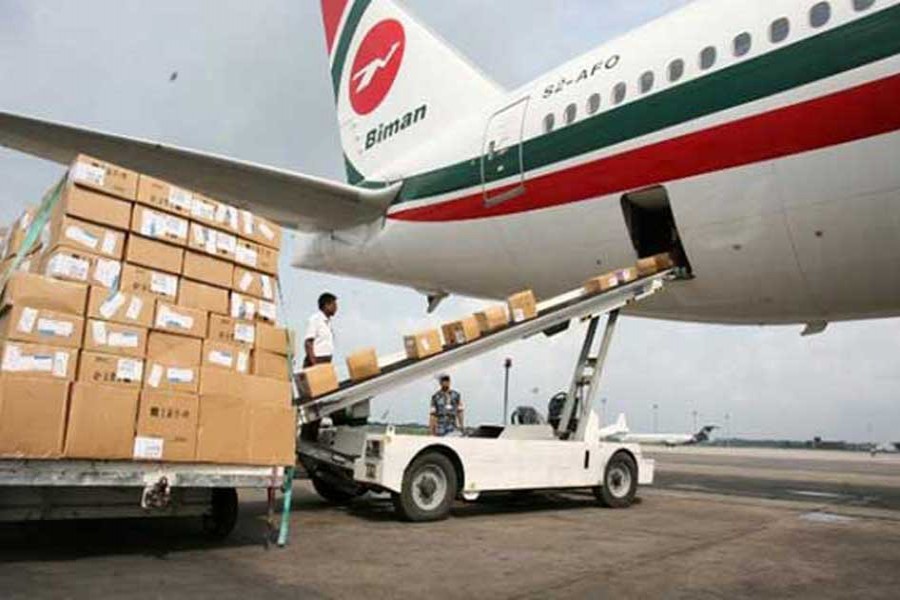It is a welcome move that the Civil Aviation Authority and Biman have stepped up efforts, albeit belatedly, to keep import cargo service at the Hazrat Shahjalal International Airport (HSIA) open for 24 hours.
The initiative was set into motion following a decision from a view-exchange meeting at the Prime Minister's Office (PMO) on September 11. With Prime Minister's Principal Secretary Md Nojibur Rahman in the chair, the participants at the meeting included presidents of Federation of Bangladesh Chambers of Commerce and Industry (FBCCI) and Bangladesh Garment Manufacturers and Exporters Association (BGMEA) and representatives from other stakeholders linked with import of goods by air.
In a bid to facilitate smooth release of imported goods, raw materials, machineries and other equipment, it was decided that all Letter of Credit (LC) opening branches of banks will remain open on Saturdays. It was decided as well that imported goods that received bank clearance bill on Thursday afternoon, can be unloaded from the airport on Saturday. Decisions were also taken on completing pre-arrival processing of cargoes, opening a hotline of Civil Aviation Authority of Bangladesh (CAAB) and introducing a one-stop service.
This move will undoubtedly benefit importers who have been complaining about the state of import cargo service for many years.
At the moment, cargoes are released between 9:00am till 5:00pm at the cargo house. Due to the time constraints, most cargoes cannot be released in due time. As such, often cargoes are left out in the open after a day's operation end.
Around two years back, an 8,000-square-feet shed was constructed where some cargoes are kept now. But a significant number of cargoes are still kept under the open skies, which often damages goods. There are numerous allegations of imported and exported items going missing from the cargo house.
Naturally, the decision from the government has been welcomed by importers as well as the civil aviation. But both sides have raised some valid points. Addressing these can help the government improve the cargo system at the airport.
First, officials from the civil aviation have alleged that in the past, when they tried to release imported cargoes around the evening, most of the time importers and their cargo and freight forwarding agencies were found absent.
Secondly, importers are of the opinion that release of imported goods can be quickened if pre-arrival processes like submission of airway bills, assessment of duties on goods and related steps could be simplified and done before the cargoes land in Bangladesh. But processing of these important steps cannot be completed in time in most cases due to the slow and erratic server of the National Board of Revenue (NBR) with which the cargo house is connected.
Third, cargoes cannot be handed over to importers without a release order from the bank in the cargo house. There is always a crowd during working hours as representatives of importers line up to get their release orders. If release orders are not approved within a certain time, the cargo release rolls on to the next day. This delays the release of imported cargoes.
As such, initiatives should be forthcoming from all stakeholders to improve these areas. In this spirit, civil aviation officials have suggested that if informed beforehand, the importers or their representatives should make it a point to be present at the cargo house at any hour of the day or night to release their cargoes.
Importers, on the other hand, have suggested if the cargo service runs for 24-hours, banking services should also continue during these hours. Otherwise, the cargoes cannot be released on the same day. Similarly, the server in the NBR should be upgraded to ensure faster processing of airway bill submissions, assessment of duties etc.
Before initiating 24-hour cargo service, another pertinent issue that the government can look into is to strengthen the security in the cargo house. There is a concern among some importers that cargo operations after dark under current circumstances will make cargoes more vulnerable to theft.
If these steps are taken, one hopes, cargo operations in the HSIA would be streamlined. This would benefit the importers and the businesses in general insofar as cost of doing business would be brought down by expediting release of cargoes.


